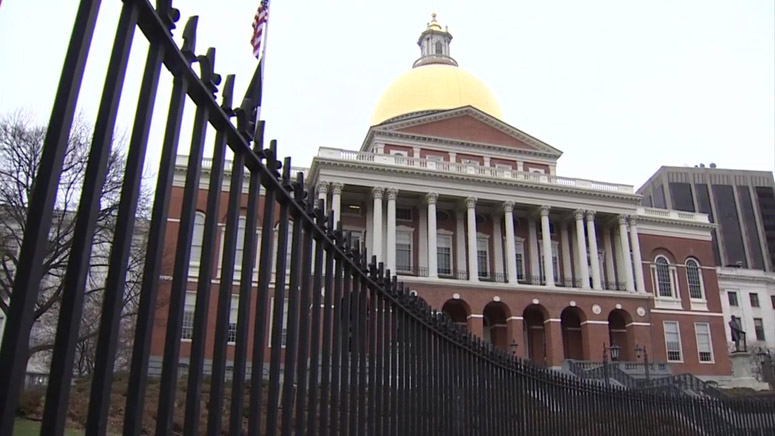All 159 members of the Massachusetts House voted Wednesday afternoon to pass a $55 million COVID-19 response bill, keeping it on track to clear the Senate and hit Gov. Charlie Baker’s desk early next week.
Almost two years into the coronavirus pandemic, Massachusetts is contending with the omicron variant that has driven daily case counts into the tens of thousands, is leading to long lines at COVID-19 testing sites and has again put stress on a health care system already challenged by staffing shortages.
“There is still much more work to be done before we see the end of this pandemic,” House Ways and Means Chairman Aaron Michlewitz said as he introduced the bill on the House floor. “We’ve all seen, heard and experienced the struggle that many across the state have had in getting a COVID test or to receive proper masks for our schools. And while the items contained in this proposal are not the panacea, they represent the most immediate and urgent pandemic-related needs that our residents are facing.”
The bill (H 4340) appropriates $30 million to establish and expand COVID testing sites, with at least $5 million dedicated to expanding vaccination rates among kids ages 5 to 11. The youth vaccination efforts would be focused on communities disproportionately affected by the virus.
Another $25 million would go towards “the acquisition and distribution of high-quality personal protective masks for children and faculty in elementary and secondary public school districts.”
Instead of tapping into some of the $2.25 billion that remains in state American Rescue Plan Act funds, the bill spends money out of the state’s general fund “but the language in this bill instructs the administration to seek FEMA reimbursements for these needs,” Michlewitz said.
Youth vaccination rates, mask standards for schools and the availability of COVID-19 testing were all issues that lawmakers pressed Baker on during an oversight hearing last week. This week, Baker has been busy promoting new testing programs his administration has established for child care centers and K-12 schools.
“The investments made here are meant to supplement initiatives that the administration has announced over the last few weeks in order to present a coordinated effort or a coordinated plan to tackle the surge,” Michlewitz said.
Asked about the $55 million bill Tuesday, Baker said he was not familiar with its details but suggested he is on board with the idea of stocking up on masks.
“The biggest challenge we have with respect to testing is much more about staff than it is about either supplies or dollars,” the governor said. “We think keeping — and I said this when I was talking to the oversight committee last week — we try to keep about a six-month supply of masks on hand. If this would be funding that would make it possible for us to continue to extend and expand our supply with respect to masks, then obviously we would put it to work that way.”
Michlewitz said the House has been “working closely with our colleagues in the Senate on this legislation so that it can move towards the governor’s desk in a timely fashion.” His Senate counterpart, Senate Ways and Means Chairman Michael Rodrigues, said Tuesday that the Senate plans to take up the COVID-19 spending bill “early next week” and it’s possible the bill could reach Baker before his Tuesday State of the State address.
The vote to pass the bill was unanimous in the House, 159-0. The House is shorthanded as a result of the Tuesday resignation of Claire Cronin of Easton. The House broke from its consideration of the COVID-19 spending bill to celebrate Cronin’s confirmation as U.S. ambassador to Ireland.
Around 70 lawmakers and 35 staff and guests turned out Wednesday to fete Cronin during the House session, one of the largest gatherings inside the House Chamber since the pandemic began and since the House passed its vaccine mandate, which affects which representatives can be present at the State House.
At one point, Speaker Ron Mariano said the fact that so many representatives were “braving the COVID” to be in attendance for Cronin’s farewell was a tribute to her and reminded members to adhere to social distancing and not greet her in the well as is customary when a representative makes a first or final speech on the House floor.
Before the bill passed, the House addressed the 23 amendments representatives filed by adopting one package consolidating a handful of the 23 proposals into a single amendment. In a strike against transparency, there was no explanation of what was being adopted in the amendment or why it was being added to the bill.
The consolidated amendment appears to add to the bill an allowance for municipalities to again hold their town meetings remotely, as many have done over the last two years, and to allow certain corporations to hold remote meetings as well. It also appears to add to the bill a Rep. John Lawn amendment that would provide liability protections for health care workers and facilities during the pandemic.
The bill would also extend some of the policies originally adopted in 2020 to reflect the realities of the pandemic era. The authorization for remote public meetings, set to lapse on April 1, 2022, would be extended through July 15, and notarization and reverse-mortgage counseling could take place remotely through July 15.
The legislation stretches beyond COVID-19 matters to schedule the state’s 2022 primary elections for Sept. 6, instead of the Sept. 20 date that would otherwise be called for under state law.
Secretary of State William Galvin has cautioned that a Sept. 20 primary would not allow sufficient time for his office to comply with a federal law that requires that ballots be ready for military and overseas voters 45 days before Election Day. Galvin’s office needs to make nomination papers available to candidates in February, leaving the Legislature without much time before the primaries must be scheduled.
(Copyright (c) 2024 State House News Service.

